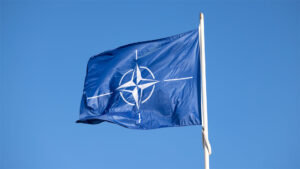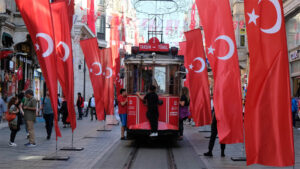There’s been a lot of movement in Turkey’s neck of the woods, so the Turks have had to change their stance on several issues. Given Turkey’s strategic positioning and importance, expect huge regional implications.
Turkey has said it will intervene with grain shipments regardless of what Russia does. Turkey won’t operate as Russia’s middleman anymore, meaning the Turks won’t be the weak link in NATO’s chain. Turkey gave Sweden the green light to join NATO. That’s not even scratching the surface of the issues Turkey has faced.
The Sea of Marmara and eastern Thrace are some of the world’s richest chunks of agricultural land. They also happen to be surrounded by regional trading routes. Turkey will be a significant regional player if it continues to hold these areas. But there are limits to the power this gives them…
While Turkey can project a great deal of power, it can’t be done everywhere. Choosing where to focus will be done through careful evaluation of the neighborhood; given the constant change in this region, it would be foolish not to expect Turkey’s strategy to adapt and evolve regularly.
Prefer to read the transcript of the video? Click here
Here at Zeihan On Geopolitics we select a single charity to sponsor. We have two criteria:
First, we look across the world and use our skill sets to identify where the needs are most acute. Second, we look for an institution with preexisting networks for both materials gathering and aid distribution. That way we know every cent of our donation is not simply going directly to where help is needed most, but our donations serve as a force multiplier for a system already in existence. Then we give what we can.
Today, our chosen charity is a group called Medshare, which provides emergency medical services to communities in need, with a very heavy emphasis on locations facing acute crises. Medshare operates right in the thick of it. Until future notice, every cent we earn from every book we sell in every format through every retailer is going to Medshare’s Ukraine fund.
And then there’s you.
Our newsletters and videologues are not only free, they will always be free. We also will never share your contact information with anyone. All we ask is that if you find one of our releases in any way useful, that you make a donation to Medshare. Over one third of Ukraine’s pre-war population has either been forced from their homes, kidnapped and shipped to Russia, or is trying to survive in occupied lands. This is our way to help who we can. Please, join us.
CLICK HERE TO SUPPORT MEDSHARE’S UKRAINE FUND
CLICK HERE TO SUPPORT MEDSHARE’S EFFORTS GLOBALLY
TRANSCIPT
Hey everybody. Peter Zeihan here. Coming to you from just below James Peak in the James Peak Wilderness. Today we’re going to talk Turkey. There’s been a lot of motion in that part of the world in the not too distant past, in the lead up to the NATO’s summit in Vilnius, during the summit and days after in the lead up to the NATO’s summit in Vilnius, during the summit and days after in the lead up to the NATO’s summit in Vilnius, during the summit and days after the Turks have changed their positions on a number of significant issues with huge regional implications. So just a quick rundown. The Turks have said that they’re going to intervene
in green shipments coming out of Ukraine. Now, there has been a deal that the Russians, Ukrainians and the U.N. have agreed to that allows Ukrainian grain to leave Ukrainian ports and not get shot at by Russian ships as long as the Russian ships can inspect the ships on the way in and on the way out to make sure that they’re not engaged in any sort of smuggling. The Russians have been backing away from that agreement and it’s basically done at this point. The Turks are no longer serving as a middleman for a lot of financial transfers and good transfers from the rest of the world to Russia.They have traditionally, I should say during the war to this point, they have been the weak spot in the NATO wall, if you will. And anything that the West used to sell to Russia or something that’s under sanctions would be sold to Turkey first and forwarded on to the Russians in violation of the sanctions, or at least to an end run. But they’re no longer doing that. In addition, the Turks gave the green light so that Sweden can join NATO. They’ve been blocking that now for over a year and all of a sudden it just evaporated. Now, there are a lot of people talking on the West about how the Turks are back in the club.Both of those statements are at best premature, but they’re probably just completely wrong and the reason is that the Turks are their own thing. Now, unlike the Western world or the Russian world, with a very clear geography that binds everyone together, the Turks have their own the Sea of Marmara region and Eastern Thrace are one of the richest chunks of agricultural land in the world. It’s got a navigable waterway system, and it straddles a number of regional trade routes. So the Turks are always going to matter. Whoever controls this area is always a going to be a significant regional power, iif not a global power. But this area is not endless. This is not the American Midwest, something that allows the United States to project power globally. This is a zone that is bracketed by a number of other regions that all matter. The Agean, the Caucasus, southern Ukraine. The Crimean Peninsula. The Balkans. Mesopotamia. The Levant. The Turks can project and do project power into all of these regions. But the Sea of Marmara region is not sufficiently powerful to give the Turks the ability to project in all of them. And so Turkish foreign strategic policy has always been about making choices, and that means they have to evaluate their neighborhood on a case by case basis, and those evaluations have to be updated from time to time. Well, if you go back to ten or 15 years ago, we had the start of the Syrian civil war, and the Turks were very upset with the entire Western coalition because of the war and what had led to it. The Turks didn’t want to see an independent Kurdistan, but the Americans relied upon the Kurds of northern Iraq in order to fight part of the war against Saddam Hussein
and with the Syrian civil war. You had, again, a Kurdish enclave, northeast Syria, that basically existed under western de facto sponsorship. There were also spats with the Israelis
to a degree backed by the United States and the Europeans. And so the Turks entered into a period where they found it easier to project power south into areas where the Americans
and the Europeans were not being very successful. In that sort of environment, There is a softness in relation with the Russians because the Russians were perceived at the time as being a bit on a roll. And so the Turks found it easier to accommodate the Russians
rather than to stand against them. Well, in the last year and a half, a whole lot of things have changed. Number one, the Americans are losing interest in Iraq and to a lesser degree, Syria, meaning that the de facto sponsorship of the Kurds has weakened quite a bit. The Russians have shown themselves to be not nearly as impressive as they look like they were. And with the Ukrainians doing better, better and better day by day by day. The Turks are wondering whether or not it’s really worth the effort, especially in the face of strong American opposition. During and leading up to the summit, the Biden administration and from the very top we’re talking here, the president and Secretary Yellen, the treasury secretary, made it very clear to the Turks what would happen to their banks if they continued serving as middlemen for the Russians. And since then, many of those banks are linked to the ruling party. That message was taken loud and clear. So the costs and benefits have changed. And all of a sudden the Turks are looking at this in a different light. So all of a sudden the South is not wide open and open to fissures that they can exploit. Suddenly, relations with the Israelis are a little bit better. Suddenly the Turks are evaluating the Russians from a different point of view and seeing them as perhaps the weak spot in their periphery these days. And so we’ve seen a lot of changes. And of course, with the summit, everyone was together and everyone had to have these conversations in real time. As regards to the United States negotiations about the transfer of F-16s to Turkey were off the table because there were concerns they were going to be used against the Kurdish minority or against countries that the United States really didn’t with the Turks going to war with. All of a sudden, that’s back on the docket. The Canadians had restarted negotiations on drone transfers, military technology to help make drones. Now, these are the same drones that the Turks have been transferring to Ukraine over the last year and a half. But the reason the Canadians had had an embargo on it is because two years ago, the Turks had transferred them
to the Azerbaijanis in their war with Armenia, all of a sudden everyone’s getting along again
and we’ll probably see some warming in relations between the Europeans and the Turks as well on a number of issues that deal with the visas, the migration, everything else. Anyway, the bottom line of all of this isn’t so much that Turkey has flipped. It’s that Turkey’s evaluation of its neighborhood changes regularly based on the strength, the power, the accession or the fall of every country in their region. And in the last two years, we’ve had a massive shift in the power balance and it would be strange to think that the Turks would not adjust accordingly. Now, winners and losers, it all depends upon who you are and what you care about. Obviously, the West broadly is pleased with the direction that the Turks are going right now, and there’s reason to believe that this has some legs. But if you’re on the other side of the equation, especially if you’re in interest of the Russians, all of a sudden this is really scary. So, for example, Armenia, Azerbaijan, the Azerbaijanis are ethnically Turkic. The Turks consider them their ethnic brothers and their friends. Armenians, on the other hand, are the complete opposite. And now that you’ve got countries like Canada saying, It might be okay for you to use your weapon systems in the
Armenia – Azerbaijan conflict. If you are Armenia in many ways this is the worst of all worlds, an Azerbaijan that is coming high off of the last war win. A turkey That’s probably going to start shipping weapons in mass again. And a Russia who has been your security guarantor
who all of a sudden is up to its eyeballs in a problem that it can’t solve in Ukraine. Things like this are going to be shaking out across the entire region as the larger geopolitics evolves. Okay. That’s it.







